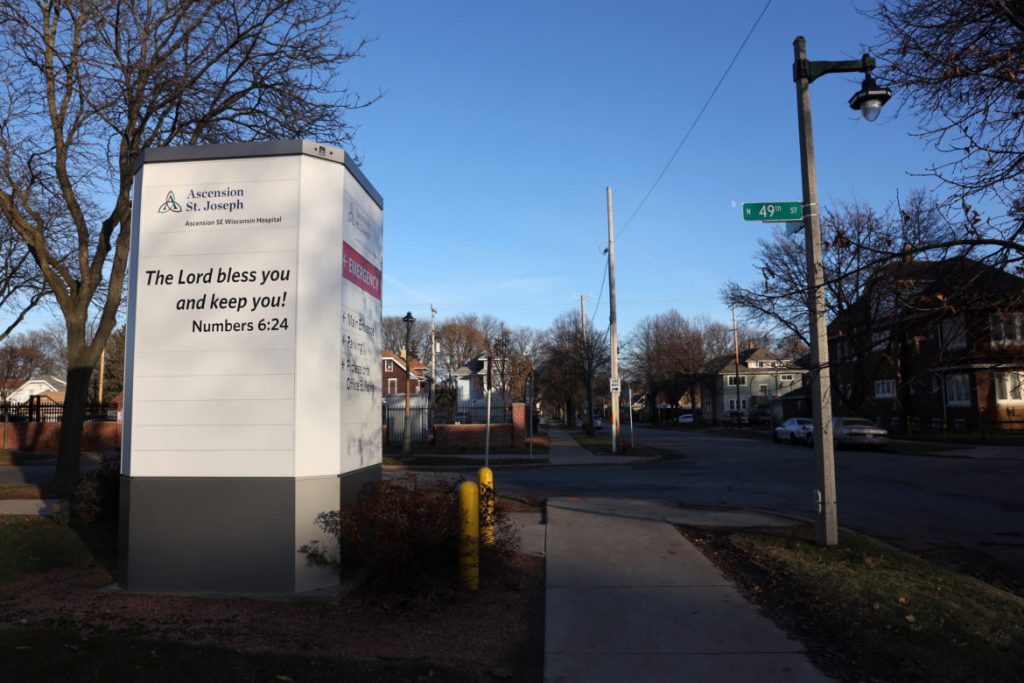City’s Minorities Depend On Catholic Hospitals
But that can mean less access to reproductive care for women.

Ascension SE Wisconsin Hospital–St. Joseph Campus in Milwaukee serves a predominantly black, low-income neighborhood, and is located between a busy commercial street on one side, and a neighborhood on the other. A Bible verse is seen on a sign outside the building. Photographed on Dec. 6. Photo by Coburn Dukehart/Wisconsin Watch.
Expectant mothers in Milwaukee County, Wisconsin, have a wealth of hospitals to choose from, unlike some of their counterparts in rural areas. For the county’s black and Hispanic women, however, the choice is often a false one.
Milwaukee babies’ first moments can reflect the city’s segregation. At the secular suburban hospital Aurora West Allis Medical Center, more than six out of 10 babies were born to white mothers, according to state Department of Health Services data. Eight miles away at St. Joseph, a Catholic hospital, more than six out of 10 babies were born to black mothers.
That trend holds statewide. One-third of births to white women statewide occur in Catholic hospitals, compared to more than half of births to black women. Wisconsin is the only state where black women are more likely to deliver their babies in a Catholic institution than a non-Catholic one, according to Columbia Law School researchers.
Serving the poor is central to the Catholic ethos. But focusing on poorer patients means the hospital’s religious-based restrictions may exacerbate existing racial and socioeconomic disparities in reproductive care. Except in emergencies, Catholic hospitals are prohibited from providing procedures the church deems immoral — including abortions, contraception and sterilization.
Women of color, those who live in poverty and those with less education are less likely to use contraception and more likely to have unintended pregnancies, according to University of California-San Francisco researchers. A quarter of all Wisconsin births resulted from mistimed or unintended pregnancies in 2017, according to federal Centers for Disease Control and Prevention data, which is similar to the national rate.
Women of color and those living in poverty are also more likely to have maternal risk factors. In Wisconsin, more than half of black mothers delivered with at least one risk factor, such as hypertension or a previous preterm birth, with researchers linking poorer birth outcomes to systemic racism, chronic stress and socioeconomic disadvantage such as substandard housing and low wages.
“You’re already facing so many barriers,” says Dr. Debra Stulberg, a physician at the University of Chicago Medicine who researches ways to improve reproductive health. “I think the harm inflicted by one additional hurdle to jump over is compounded and needs to be seen in a light that gives it full weight.”
This story was a collaboration between Wisconsin Watch, the Cap Times and Fuller Project, a nonpartisan, nonprofit news outlet that focuses on women’s issues. The nonprofit Wisconsin Watch (www.WisconsinWatch.org) collaborates with Wisconsin Public Radio, Wisconsin Public Television, other news media and the University of Wisconsin-Madison School of Journalism and Mass Communication. All works created, published, posted or disseminated by Wisconsin Watch do not necessarily reflect the views or opinions of UW-Madison or any of its affiliates.
-
Wisconsin Lacks Clear System for Tracking Police Caught Lying
 May 9th, 2024 by Jacob Resneck
May 9th, 2024 by Jacob Resneck
-
Voters With Disabilities Demand Electronic Voting Option
 Apr 18th, 2024 by Alexander Shur
Apr 18th, 2024 by Alexander Shur
-
Few SNAP Recipients Reimbursed for Spoiled Food
 Apr 9th, 2024 by Addie Costello
Apr 9th, 2024 by Addie Costello





















